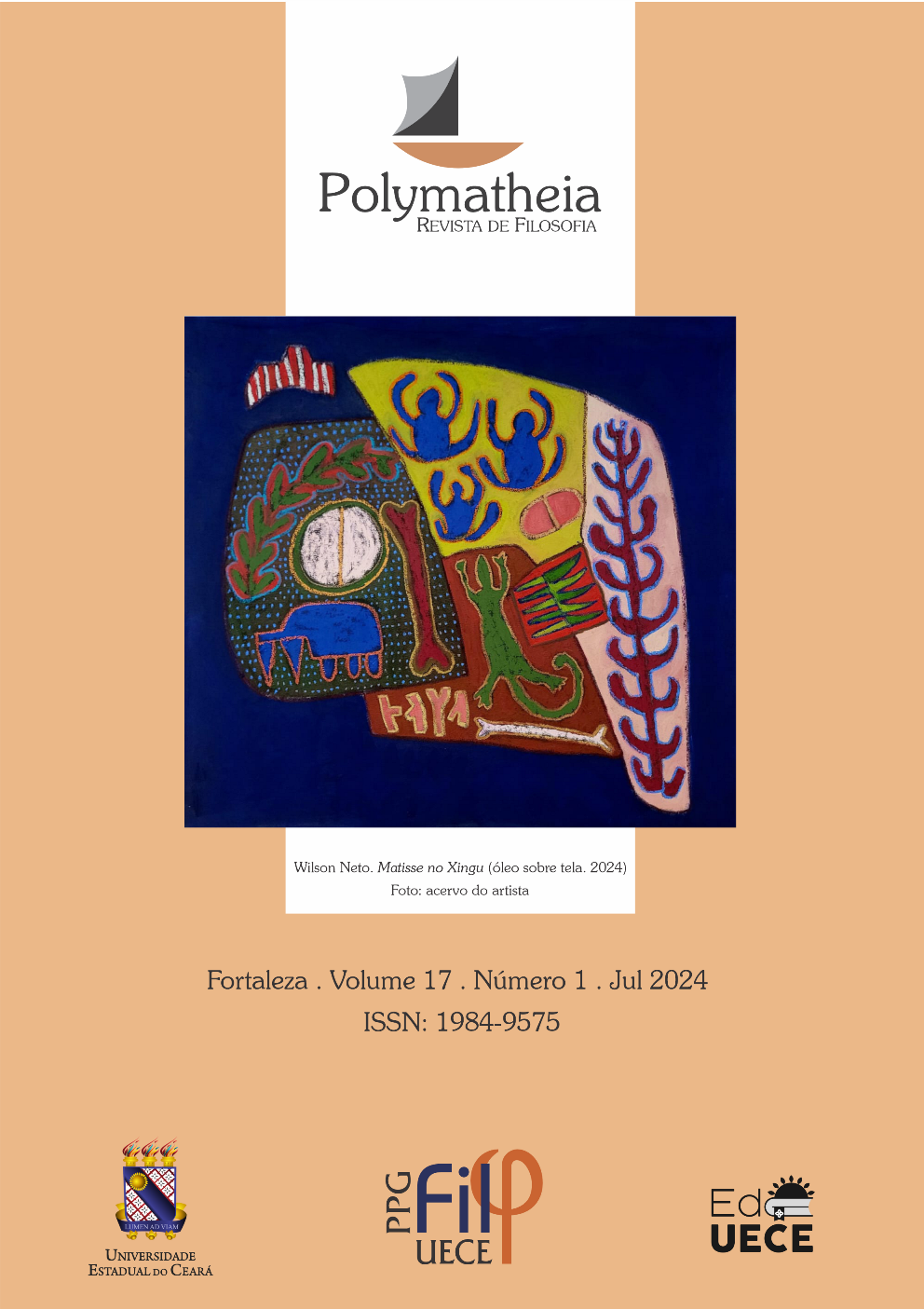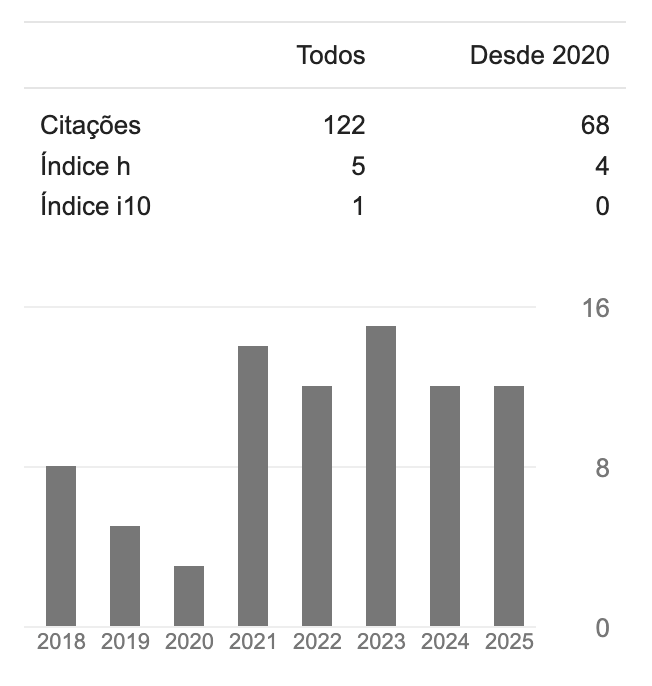VIOLÊNCIA REVOLUCIONÁRIA COMO EXPRESSÃO DE JUSTIÇA E INTERRUPÇÃO DO CURSO HISTÓRICO EM WALTER BENJAMIN
Keywords:
History, Justice, Revolution, Teleology, ViolenceAbstract
The present work aims at demonstrating that a close reading of the text Towards the Critique of Violence, written by Walter Benjamin in 1921, provides notable support to the comprehension of the author’s proposal of revolution as interruptive action in his theses “On the Concept of History” (1940). Thus, the grounds of the Benjaminian categorization of violence are discussed and it is clarified that revolutionary violence is understood not as having justice as a goal, but as being itself an expression of justice. Therewith, Benjamin’s opposition to evolutionary Marxism can be analyzed in further details, as also his assertion that the revolution constitutes an interruption of historical process instead of a result of it.
Downloads
References
BENJAMIN, Walter. Anmerkungen zu „Über den Begriff der Geschichte“. In: BENJAMIN, Walter. Gesammelte Schiriften I. Frankfurt am Main: Suhrkamp, 1974a [1940], pp. 1223-1267.
BENJAMIN, Walter. Über den Begriff der Geschichte. In: BENJAMIN, Walter. Gesammelte Schiriften I. Frankfurt am Main: Suhrkamp, 1974b [1940], pp. 691-704.
BENJAMIN, Walter. Zur Kritik der Gewalt. In: BENJAMIN, Walter. Gesammelte Schriften II. Frankfurt am Main: Suhrkamp, 1991a [1921], pp. 179-203.
BENJAMIN, Walter. Einbahnstraße. In: BENJAMIN, Walter. Gesammelte Schriften IV. Frankfurt am Main: Suhrkamp, 1991b [1928], pp. 83-148.
BENJAMIN, Walter. Der Sürrealismus: Die letzte Momentaufnahme der europäischen Intelligenz. In: BENJAMIN, Walter. Gesammelte Schriften II. Frankfurt am Main: Suhrkamp, 1991c [1928], pp. 295-310.
BENJAMIN, Walter. Das Leben der Studenten. In: BENJAMIN, Walter. Gesammelte Schriften II. Frankfurt am Main: Suhrkamp, 1991d [1915], pp. 75-87.
BENSAÏD, Daniel. Walter Benjamin : Sentinelle messianique. Paris: Plon, 1990.
BÍBLIA DE JERUSALÉM. São Paulo: Paulus, 1985.
BIRNBAUM, Antonia. Bonheur Justice – Walter Benjamin : le détour grec. Paris: Payot, 2008.
BOJANIĆ, Petar. Violence and Messianism: Jewish Philosophy and the Great Conflicts of the 20th Century. Tradução de Edward Djordjevic. Oxon e Nova Iorque: Routledge, 2018.
BUBER, Martin. Drei Reden über das Judentum. Frankfurt: Rütten & Loening, 1920a [1911].
BUBER, Martin. Die Legende des Baalschem. Frankfurt: Rütten & Loening, 1920b [1908].
BUBER, Martin. Der Mythos der Juden. In: VEREIN JÜDISCHER HOCHSCHÜLER BAR KOCHBA. Vom Judentum: Ein Sammelbuch Lípsia: Kurt Wolff Verlag, 1913, pp. 21-31.
BUTLER, Judith. Parting Ways: Jewishness and the Critique of Zionism. Nova Iorque: Columbia University Press, 2012.
CANTINHO, Maria João. Walter Benjamin e a história messiânica: contra a visão histórica do progresso. Philosophica, v. 37, 2011, pp. 177-195.
CHAVES, Ernani. Mito e política: notas sobre o conceito de destino no “jovem” Benjamin. Trans/Form/Ação, v. 17, 1994, pp. 15-30.
COHEN, Hermann. Die Religion der Vernunft aus den Quellen des Judentums. Lípsia: Gustav Fock G.m.b.H., 1919.
DE WILDE, Marc. Meeting Opposites: The Political Theologies of Walter Benjamin and Carl Schmitt. Philosophy & Rhetoric, v. 44, n. 4, 2011, pp. 363-381.
DERRIDA, Jacques. Force of Law: The “Mystical Foundation of Authority”. In: CARLSON, David Grey; CORNELL, Drucilla; ROSENFELD, Michel (eds.). Deconstruction and the Possibility of Justice (pp. 3-67). Londres e Nova Iorque: Routledge, 1992.
DEUBER-MANKOWSKY, Astrid. Niobe and Korah, Different Orders of Time: A Commentary on Paragraphs 14-17 of Walter Benjamin’s “Toward the Critique of Violence”. Critical Times, v. 2, n. 2, 2019, pp. 295-305.
FRANCE, Anatole. Le lys rouge. Paris: Calmann-Lévy, 1906 [1894].
GREENBERG, Udi E. Orthodox violence: “Critique of Violence” and Walter Benjamin’s political theology. History of European Ideas, v. 34, n. 3, 2007, pp. 324-333.
HILLER, Kurt. Anti-Kain: Ein Nachwort zu den Vorhergehenden. In: ______ (ed.). Das Ziel: Drittes der Jahrbücher für geistige Politik. Herausgegeben von Kurt Hiller. Erster Halbband. Lípsia: Kurt Wolff Verlag, 1919, pp. 24-32.
HONNETH, Axel. »Zur Kritik der Gewalt«. Em: LINDNER, Buckhardt (org.). Benjamin Handbuch: Leben – Werk – Wirkung (pp. 193-210). Estugarda e Weimar: Verlag J.B. Metzler, 2011, pp. 193-210.
LÖWY, Michael. Walter Benjamin: aviso de incêndio. Uma leitura das teses “Sobre o conceito de história”. Tradução de Wanda Nogueira Caldeira Brant. São Paulo: Boitempo, 2005.
MÜLLER, Jan-Werner. Myth, law and order: Schmitt and Benjamin read reflections on violence. History of European Ideas, v. 29, 2003, pp. 459-473.
ROSS, Alison. The Distinction between Mythic and Divine Violence: Walter Benjamin’s “Critique of Violence” from the Perspective of “Goethe’s Elective Affinities”. New German Critique, v. 41, n. 1, 2014, pp. 93-120.
SCHMITT, Carl. Politische Theologie: Vier Kapitel zur Lehre von der Souveränität. Munique e Lípsia: Verlag von Duncker & Humboldt, 1934 [1922].
SCHOLEM, Gershom. Zum Verständnis der messianischen Idee im Judentum. In: FRÖBE-KAPTEYN, Olga (ed.). Die Erneuerung des Menschen. Zurique: Rhein-Verlag, 1960, pp. 193-239.
SCHOLEM, Gershom. Walter Benjamin – Die Geschichte einer Freundschaft. Frankfurt: Suhrkamp, 1997 [1975].
TAUBES, Jacob. Ad Carl Schmitt: Gegenstrebige Fügung. Berlim: Merve Verlag, 1987.
Downloads
Published
How to Cite
Issue
Section
License
Copyright (c) 2024 Leonardo Uderman

This work is licensed under a Creative Commons Attribution 4.0 International License.











